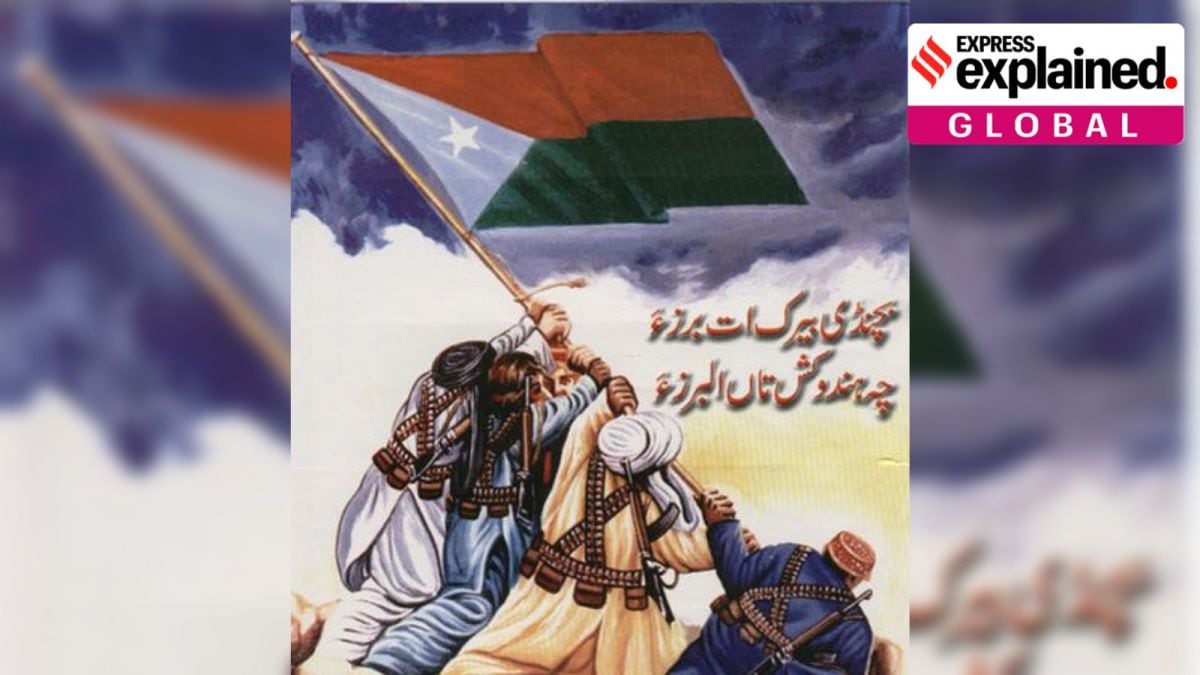Who are the Majeed Brigade, the Baloch militants who carried out Gwadar attack?
The BLA is the most prominent of the many separatist groups in Pakistan’s restive Balochistan province.

The Majeed Brigade of the separatist group Baloch Liberation Army (BLA) has claimed responsibility for Wednesday’s attack on a complex outside Pakistan’s strategic Gwadar Port. Pakistan has said eight militants and two security personnel were killed in the attack; the BLA has, however, claimed to have killed 25 security personnel.
The BLA is the most prominent of the many separatist groups in Pakistan’s restive Balochistan province. The Majeed Brigade, which has been active since 2011, is the BLA’s dedicated suicide squad. The unit is named after two brothers, both of whom were called Majeed Langove. This is their story.
The Balochistan context
Balochistan, in Pakistan’s southwest, is the country’s largest and most sparsely populated province. It has oil reserves and abundant natural resources, but the ethnic Baloch are Pakistan’s poorest and most under-represented people.
At the time of Partition, Balochistan comprised multiple chiefdoms owing allegiance to the British. Ahmed Yar Khan, the chief of Kalat, was the most powerful of these tribal chiefs, and hoped to secure an independent state for his people. However, he was forced to accede in 1948, after Pakistan invaded Kalat.
This triggered an insurgency which remains ongoing, fuelled by persisting economic disaffection, political disenfranchisement, and repression by the Pakistani state.
In many ways, the China-backed Gwadar Port is a symbol of the economic injustice faced by the Baloch — despite rampant unemployment in the province, engineers and technical specialists were hired from Punjab, Sindh, and even China.
In recent years, Baloch militants have repeatedly targeted both Gwadar and Chinese nationals in the country.
Majeed Sr and Bhutto
In May 1972, the National Awami Party (NAP) came to power in Balochistan. Nationally, the NAP sat in opposition to Prime Minister Zulfiqar Ali Bhutto’s Pakistan Peoples’ Party (PPP). The NAP had long advocated for greater regional autonomy in Pakistan, and it was emboldened by the secession of Bangladesh in 1971.
But Bhutto, chafing from the humiliation of Pakistan’s defeat to India, was unwilling to grant any major concessions. From the beginning of the NAP’s term in the provincial government, Bhutto attempted to undermine its working, using the office of the governor and the bureaucracy of Balochistan, which remained under the control of the Pakistan central government.
Meanwhile, the more radical Baloch nationalists continued the insurgency, which created a serious law and order situation in the province.
After a cache of arms supposedly meant for insurgents was discovered, Bhutto dismissed the NAP government in February 1973. This led to both the insurgency and the Pakistani state repression becoming worse in Balochistan. Between 1973 and 1977, thousands of fighters and military personnel were killed in the fighting, and there were reports of mass atrocities against the Baloch by Pakistani forces.
It is in this context that Majeed Langove Senior, then a young Baloch man, decided to assassinate Bhutto. On August 2, 1974, as Bhutto arrived in Quetta to attend a public gathering, Majeed Senior waited atop a tree, a grenade in hand. He had no plans to escape, and was most certainly going to lose his life in his bid to kill Bhutto.
And he did — even before he had a chance to kill the Pakistani leader. The grenade burst in Majeed Senior’s hand as he waited for Bhutto’s motorcade, killing him instantly.
Jr’s sacrifice, Majeed Brigade
The death of Majeed Senior was mythologised for posterity by the actions of his younger brother, Majeed Langove Junior, who was born two years after Senior was killed.
On March 17, 2010, Pakistani forces surrounded a house hosting a number of Baloch militants in Quetta. One man — Junior — decided to put up a fight, and buy time for his comrades to exit. After an hour’s resistance, Junior was killed.
Majeed Junior’s death was mourned by nationalists across Balochistan. After it became widely known that he was the younger brother of Senior, who too had given his life for the cause of Balochi freedom, the Majeed Langove brothers were raised to near-mythical status.
When Aslam Achu, a BLA leader, decided to establish a suicide squad, the name ‘Majeed’ was chosen for it. The Majeed Brigade carried out its first suicide attack on December 30, 2011, targetting a tribal leader and Pakistan Army proxy called Shafiq Mengal. While Shafiq himself escaped unhurt, at least 14 persons were killed and another 35 were injured.
After a long hiatus, the group became active again in 2018, attacking a bus carrying Chinese engineers in Dalbandin near the Pakistan-Afghanistan border. This attack was carried out by Rehan Aslam Baloch, the 22-year-old son of Aslam Achu.
The Majeed Brigade has also attacked the Chinese Consulate in Karachi (2018), the Gwadar Pearl Continental Hotel (2019), and the Pakistan Stock Exchange in Karachi (2020), according to the South Asia Terrorism Portal.